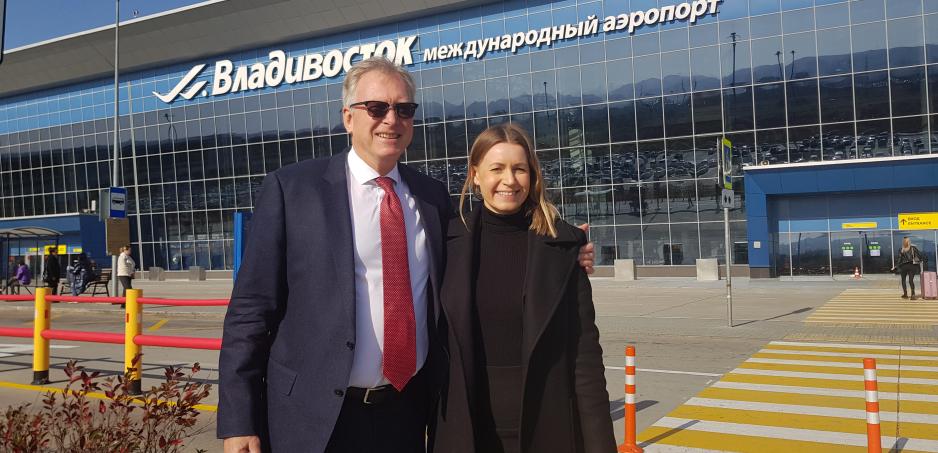Newsletter: Paper Polar Bears, Doing Business in Russia and Trump - Again

Ambassador to Russia Rune Resaland (left) has a clear call to Norwegian businesses about looking to Russia: - Everything that is not banned, is permitted. Photo: Arne O. Holm
Dear High North News-reader!
There are not many weeks between each time there is an Arctic conference. Last week, the Northern Dimension took place in Bodø, Norway. This week, the Arctic went to Brussels for the Arctic Futures Symposium. [Norwegian only]
It is the 10th annual conference, but the items on the agenda have not changed much. The Arctic Futures Symposium, just like many other Arctic conferences, does not manage to make anything but scratch the surface of the problems.
Maybe because of the tense geopolitical situation in the world. Maybe because there is fear that multilateral forums shall crack or fragile constellations shall crumble.
Or perhaps because having as many panelists as possible on stage is deemed absolutely necessary. That limits the time left for genuine discussion and fruitful debate, and it reduced the debates to a showroom for individuals’ messages.
Paper polar bear?
One example is the debate about the Arctic Council; what it is and what it does, and even more important: What should be in the future.
I understand that one is hesitant about making massive changes to the Arctic Council at present out of fear that the consequence may be the crumbling of the entire Council.
However, I fear that people – those who do not hold a particular interest – will perceive the Arctic Council of 2019 more as a passive paper organization than as an important actors who is crucial in maintaining the Arctic as a peaceful and stable region.
This week the question was asked: Has the Arctic Council become a paper polar bear – outwardly powerful, but inwardly ineffectual?
Perhaps it is time for the Arctic Council to get its act together and attack Trump, rather than opting for a strategy that appears to be about sitting still in the boat and waiting for calmer waters. I personally believe that this storm will rage on for a while, so the wait may be a long one. Do we have time for that?
Soon ice-free
The fact that the climate issue is the elephant in the room of the Arctic Council – at least one of them – is no secret.
Scientists argue that only the ice north of Greenland and around the Canadian Arctic archipelagos will survive. The rest of the Polar Sea will be virtually ice free for parts of the year.
Trumples into Alaska…
In the USA, President Trump wants to open even more of the magnificent and unspoiled Alaskan nature for oil extraction. [Norwegian only] That would, once again, revoke one of President Barack Obama’s decisions to protect Alaska’s wilderness.
In 2013, the Obama administration decided to protect about half the area in order to protect the region’s precious fauna and culture. American environmental organizations have announced their wanting to fight the newly proposed plans.
…and Greenland
We all remember this autumn’s great news that Donald Trump wanted to buy Greenland off from Denmark. New theories are now launched regarding what may be the real motive behind the “property deal proposal”.
Retired Rear Admiral Torben Ørting Jørgensen of Denmark argues that the USA’s initiative most likely is caused by nervousness following their discovering new Russian so-called hypersonic missiles that are capable of bringing forth conventional bombs as well as nuclear bombs.
“President Putin has boasted of how they are already in production. This must have come as a most unpleasant surprise for the American military, as it has happened a lot faster than they expected”, he says to High North News.
“Everything that is not banned, is permitted”
We will stay in Russia, though now we will go east. High North News has been in Vladivostok in the Far East chasing the Russian trade market in a time where Norwegian-Russian business cooperation reaches a new-time low.
Yet at the same time, several Norwegian companies are at the starting line of bringing home money from a Russian market with sanctions in place. We have met with three of them, as well as with an ambassador who argues that “everything that is not banned is permitted”.
Brings her homeland before the ECHR
In 2013, Tatiana Kuklbakina took the Russian state to the European Court of Human Rights in Strasbourg for two incidents she claims are violations of the European Human Rights Convention.
“The freedom of assembly was and still is important to me, and I would be happy if the Court could point out Russia’s mistake,” Kubalkina says to the independent Russian news outlet 7x7 about the case’s currently being assessed.
With these reads, we wish you all the best for the weekend and start of the advent season!
Siri Gulliksen Tømmerbakke
News Editor, High North News
